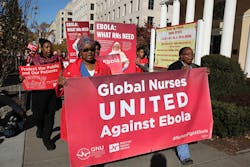The nation’s largest union of nurses is calling on OSHA and state-plan states to follow the “landmark mandatory safeguards” that California issued last week to protect health care workers and the public from the Ebola virus.
On Friday, California safety and health authorities issued updated guidance requiring hospitals to provide head-to-toe PPE and comprehensive training for health care workers attending to Ebola patients. The guidance includes protocols that National Nurses United has been pushing in California and across the nation for two months, the union said.
Although California already has standards that address potential exposure to infectious diseases in health care facilities – including the Bloodborne Pathogens standard (adoped in 1992) and the Aerosol Transmissible Diseases standard (adopted in 2009) – state safety and health officials issued the updated guidance to "clarify the requirements hospitals must meet to maintain workplace safety and to prevent exposure to Ebola," Acting Cal/OSHA Chief Juliann Sum noted last week.
“California nurses, other health workers and the public will be safer, but Ebola and other pandemics know no borders. Federal officials and other states should adopt the same standards,” said RoseAnn DeMoro, executive director of National Nurses United and the California Nurses Association. “If California can act, all our other elected leaders and agencies can as well.”
More than 60,000 people have signed an online petition calling for the federal government to require hospitals to adopt California’s Ebola safeguards, according to the union. Last week, 100,000 nurses participated in a global day of Ebola awareness to demand the highest level of protections for health care workers.
National Nurses United said it will press for Ebola legislation and regulation in other states, and will continue to demand that the federal government enact mandatory Ebola guidelines – modeled on the California standards – that all hospitals must follow.
“Nurses have raised their voices, and California, under the leadership of Gov. Jerry Brown, has listened, acted and once again set a benchmark for the nation,” DeMoro said.
National Nurses United asserted that California’s Ebola standards “go well-beyond the faulty procedures and protective gear employed by hospitals across the U.S., and the current, unenforceable recommendations of the federal Centers for Disease Control and Prevention.”
The guidelines require California hospitals to provide full-body protective suits that meet the ASTM F1670 standard for blood penetration and the F1671 standard for viral penetration and that leave no skin exposed or unprotected. The suits must be available for all hospital staff providing care for a suspected or confirmed Ebola patient, as well employees cleaning contaminated areas and staff assisting other employees with the removal of contaminated protective gear.
Also, hospitals must provide powered air-purifying respirators with a full cowl or hood for the head, face and neck of any RN or other staff member who provides care for a suspected or confirmed Ebola patient.
Hospitals must conduct hands-on training for any worker who is at risk of exposure.
National Nurses United noted that California’s regulations are mandatory. If hospitals don’t comply with the guidelines, they will face civil penalties, according to Juliann Sum, acting chief of Cal/OSHA.
“The California regulations embody the precautionary principle [National Nurses United] has advocated in response to Ebola: that absent scientific consensus that a particular risk is not harmful – especially one that can have catastrophic consequences – the highest level of safeguards must be adopted, and a sharp contrast to the profit principle that has guided the response of most hospitals,” DeMoro said.
